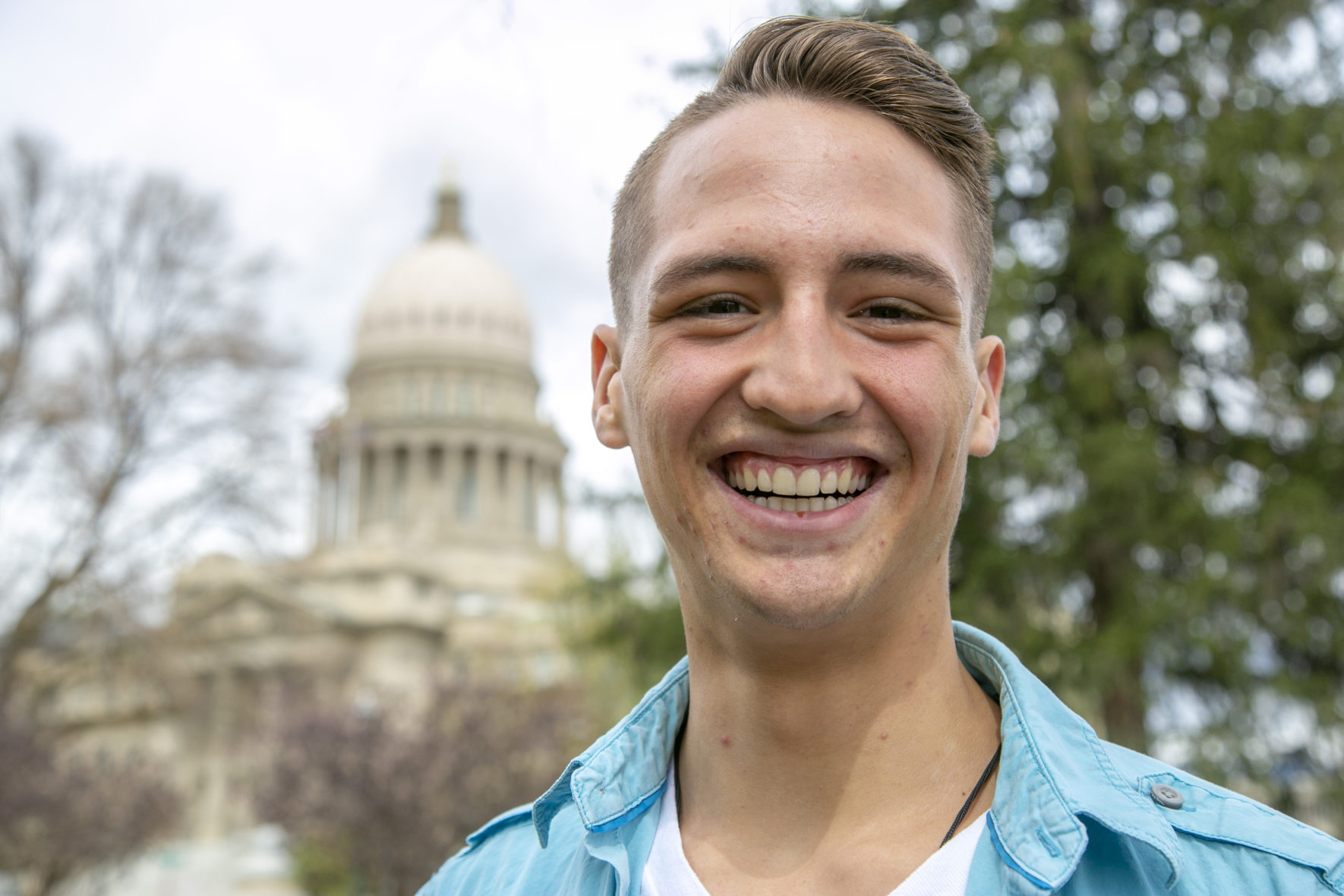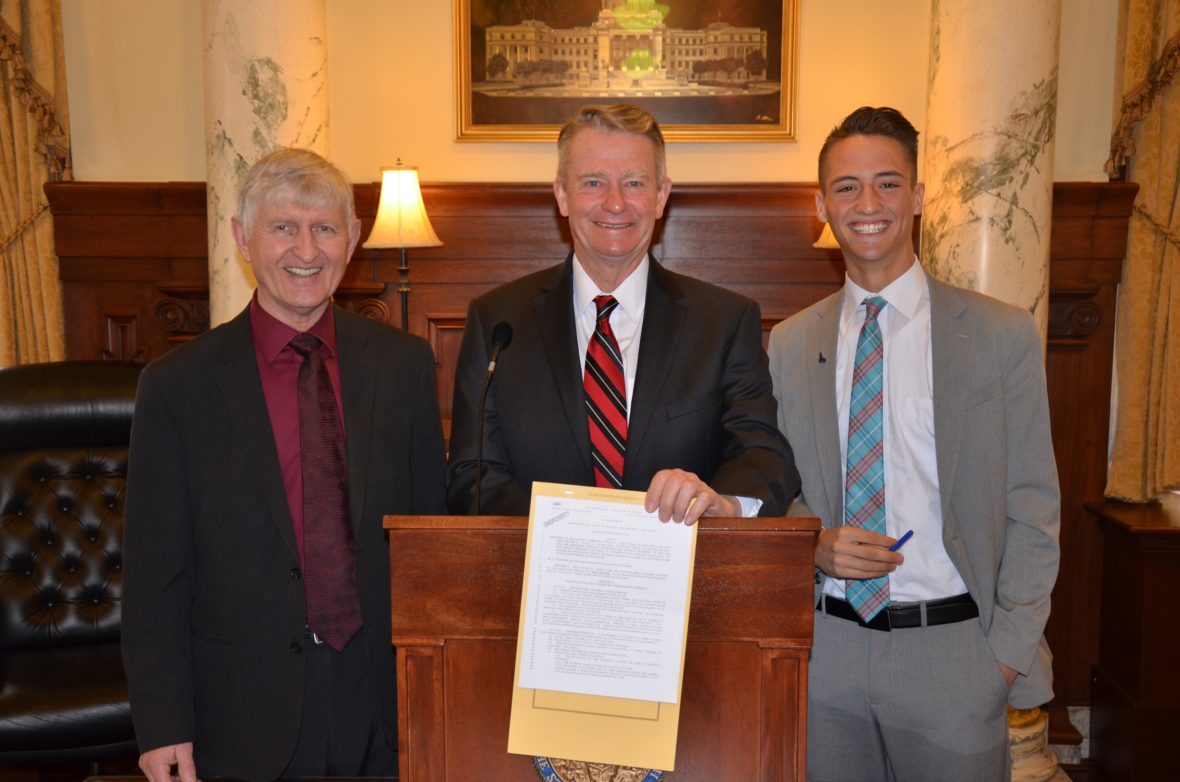Sebastian Griffin won’t benefit from his lobbying efforts.

Griffin believes high-achieving students should be able to draw up a flexible school schedule that lets them pursue their career goals. Griffin is graduating from Nampa High School this spring, but he hopes his idea will help Nampa sophomores and juniors. Years down the road, Griffin hopes his own kids will put his idea to use.
After an intense and circuitous path through the legislative process, Griffin reached the finish line on April 4. He attended a Statehouse ceremony to watch Gov. Brad Little sign Senate Bill 1060 into law.
The 2019 legislative session was defined by debate over the people’s role in the process — embodied by the bitter battle over proposals to restrict voter initiatives. But Griffin says he’d like to see other students take their ideas to the Statehouse.
“Anyone can get involved,” he said. “Anyone can have a voice.”
SB 1060 will allow some high school students to graduate early and pursue any number of other scheduling options — such as college classes, career-technical programs, internships or apprenticeships. As a political junkie, Griffin says he would have used this flexibility to work as an intern at the Statehouse or a law firm.
This option will only be available to students who meet several criteria — including at least a 3.5 GPA and a “college- and career-ready” benchmark score on the SAT or the ACT.
And unlike Idaho’s growing advanced opportunities program — which allows students to get a jump on college credits, on the taxpayer’s nickel — a flexible schedule is geared toward students with a focused career plan.
“I don’t see this working for every student,” Griffin said. “Of course it won’t. Advanced opportunities doesn’t work for every student.”
The idea grew from Griffin’s own experience. As a sophomore, he had a 4.0 GPA, but he felt he was wasting his time. A teacher urged him to get involved in local government issues.
Along the way, Griffin found a receptive audience in Senate Education Committee Chairman Dean Mortimer, who had his own worries about students who burn out and check out. The Idaho Falls Republican had heard from a friend whose daughter was sick of school, even though she was getting good grades. She enlisted in the military at 17 and got her GED instead.
While Mortimer saw the need for another option for students, he credited Griffin with doing the research. Griffin developed an online survey to gauge student interest, and prepare for running a bill in 2019.
“That’s when it all started to go crazy,” he said.
At the urging of superintendents, Griffin got rid of language that would have created a special, separate diploma for early graduates. The Senate passed the bill, but only after amending it. The House Education Committee grilled supporters on the bill — the one time Griffin said he had doubts about the bill’s prospects. One set of House amendments failed. A second set passed.
It’s rare for lawmakers to take three runs at amending a bill, and rarer still for a bill to survive such a heavy amendment process. But lawmakers of both parties vowed that they weren’t out to kill the bill — a sign of good faith, said Griffin. “No one is trying to just screw the system.”
Rep. John McCrostie, D-Garden City, worked on amendments with Sen. Steven Thayn, R-Emmett, the Senate sponsor of the bill.
“I think we all agreed on the concept,” McCrostie said. “We wanted to make it a good bill … In this particular case, we were able to hash it out, and got a better bill.”
For all the rewriting, SB 1060 passed both houses unanimously. Griffin watched the final, eight-minute floor activity from afar. He was in the Dominican Republic for spring break, traveling with a student group and visiting his father. He said he felt at peace as he watched the online stream from the Senate floor.
“All this built-up time, all this built-up energy … it’s all going to be done, after this final vote,” Griffin recalled thinking.

Griffin got involved in politics early, but with a narrow focus. After his parents divorced, Griffin and his mother moved from Eagle to Nampa. He wanted to see his middle school offer more dances, so he ran for student government in eighth grade. He has remained involved since then, and is Nampa’s senior class president.
Griffin also spent the first half of the legislative session as a page for the Senate Commerce and Human Resources Committee. The assignment gave Griffin access to lawmakers and the chance to get to know them better. And that ties in with one lesson Griffin said he learned from this session: the value of building personal relationships with elected officials.
In time, Griffin hopes to be on the other side of this relationship. After serving a mission with The Church of Jesus Christ of Latter-day Saints, Griffin plans to attend Brigham Young University and major in finance. From there, he plans to earn a master of business administration and a law degree, and return to Idaho in a decade to run for the Legislature.
“That’s just the 10-year plan,” he said. “After that, who knows?”
More reading: Here’s a link to our October 2016 feature on Griffin.
